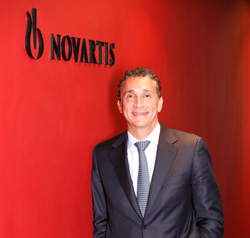“If you use patient-centricity to generate more sales you will fail, if that’s your purpose, you will fail,” says Cesar Concepcion, Managing Director, Novartis Spain.
This earnest warning to companies who might try to cash in on patient-centricity – using it as a pretext to push margins – is also a disarming blow to pharma’s naysayers, who are quick to tar everyone with the same brush.
“I worked in oncology for many years and, in this area, it is quite easy to understand the patient journey because the patient is facing a very difficult time,” says Concepcion. “There is a special sensitivity and sense of urgency about wanting to help patients because they have a clear need and, in order to help, that needs to become the top priority, no matter what.”
He is keen to draw on this sense of urgency and sensitivity in his present role, bringing Spain in line with the company’s global remit. He consulted directly with patient advocacy groups in Spain to send the message that the patient is at the forefront of everything Novartis does.
Cementing the company’s commitment to patient-centricity, Novartis issued a patient declaration to all members of the organisation; a manifesto of sorts outlining patient priorities. The crux of the declaration is a formal reminder to always put the patient at the heart of every decision and at the forefront of every innovation.
“It creates a strong symbol that we really mean it, we have a commitment to this. To be practical, no one goes around reciting the patient declaration, but it complements the whole mindset and philosophy about doing the right thing for patients,” says Concepcion.
Enshrining these values across the organisation is key to aligning the Spanish organization with the global patient-centric efforts, he says. The guiding principle in Concepcion’s teaching is to combine scientific knowledge with an understanding of a patient’s disease through “sensitivity and interpersonal communication skills” in order to truly connect with a patient.
Embedding patient-centricity into the internal processes and sharing patient stories also gives companies the necessary jolt to help them see the wood for the trees, he says.
“It is a wakeup call – we sometimes get too absorbed in the minute details. We are public companies at the end of the day, we are business people, and we have a serious responsibility to our shareholders. All that is fine but we are also leaders in the healthcare industry. We are a pharmaceutical company, we are in the business of innovation and, with that, comes a big ethical responsibility, which is to improve and prolong patients’ lives,” he asserts.
The challenges are not insignificant, however, and successful implementation depends on putting the “right people in the right positions and combining areas that complement each other,” says Concepcion, the crucial cog in the operation being communication.
Once you crack this internal formula, it will feed into the external, says Concepcion. “Our communications team speaks directly to patients, and in this way, it is all about our external environment, it is all about the patients, projecting the right message and image to the organisation but also to the communities, and to society in a way that has impact.
“When you have it this way, it's completely apart from commercial, it doesn't mean that commercial doesn't know what's going on and that is not an integral part of what we do but it keeps it in a way that is more-or-less sacred. You must protect the credibility of the concept,” he says.
Concepcion also appreciates that patient touchpoints differ from country to country. “In Spain, the patient today doesn't really get involved too much in the decision of his or her treatment, in the United States, you are bombarded by direct consumer campaigns. In Spain, there is still a lot of respect for the doctor – the doctor is seen as the important decision-making person.”
Despite the challenges presented by differing cultures and customs, Concepcion is unequivocally optimistic about patient-centricity’s future. “It is here to stay, it will only become more important and this is no secret, pharma has to adapt to whatever the situation requires,” he says.
Technological innovations will also continue to fundamentally change the nature of patient touchpoints, a fact pharma must meet head on, Concepcion says. “The information age is not going anywhere, it is only going to evolve, then it could potentially turn into a new source of intelligence, perhaps instead of a physician making a treatment decision, it could be more like 'well, let me look at this, this is what the computer or a virtual app is saying’.”
Related Content: Pharma's Moment To Shine Redefining Medical Need Asking The Big Questions Précis: Novartis Spain’s Cesar Concepcion is on a mission to champion the patientPremium`: Freemium`: Channels: CommercialTags: patient centricityOriginal Article
Précis: Novartis Spain’s Cesar Concepcion is on a mission to champion the patientPremium`: Freemium`: Channels: CommercialTags: patient centricityOriginal Article


